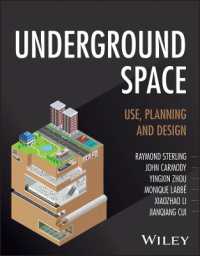- ホーム
- > 洋書
- > 英文書
- > Nature / Ecology
Full Description
This book brings together a multidisciplinary collection of research that highlights innovative approaches to creating more sustainable, resilient, and inclusive environments. This volume addresses the urgent need to integrate ecological principles, technological advancements, and community-centered design in shaping the built environment. The contributions span a wide range of topics, including sustainable urbanism and inclusive city design, with a focus on climate adaptation, aging societies, and public space connectivity. Cultural heritage and community landscapes are explored through the lens of traditional architecture, urban morphology, and revitalization strategies. Advances in environmental technologies and renewable energy solutions are presented through studies on solar applications, PV-integrated designs, and energy-efficient systems. Water systems and blue-green infrastructure are examined in the context of arid urban environments and sustainable water harvesting. In the field of construction, the book explores circular economy practices, waste management, and sustainable materials. It also explores smart design and biophilic innovation, emphasizing the role of digital architecture and agile methodologies. Finally, it highlights environmental health and microbiological systems, investigating indoor air quality, material performance, and microbial ecology. This comprehensive volume serves as a valuable reference for researchers, practitioners, and policymakers committed to sustainable development through the integration of design, ecology, and engineering.
Contents
Topic 1: Sustainable Urbanism and Inclusive City Design.- 1. Designing Sustainable Urban Spaces for Aging Societies: Models for Enhanced Autonomy and Social Connection.- 2. Adaptive Reuse of Sha'abiat Neighborhoods: Integrating Lived Experiences into Heritage Preservation and Sustainable Urban Development.- 3. Bridging Neighbourhoods: The Impact of Urban Parks in Connectivity.- 4. Resilience in Urban Public Spaces: The Example of Kyrenia, Cyprus.- 5. Climate Resilience of Suburban Hillside Areas.- 6. Planning Strategies for Reducing Environmental and Health Implications of Urban Heat Island Effect: A Case of Kochi, Kerala.- 7. Assessing the Relationship between Urban Compactness and CO2 Emissions: A Study on Intra-Urban Passenger Transport in Indian Cities. Sustainable Urbanism and Inclusive City Design.- 1. Designing Sustainable Urban Spaces for Aging Societies: Models for Enhanced Autonomy and Social Connection.- 2. Adaptive Reuse of Sha'abiat Neighborhoods: Integrating Lived Experiences into Heritage Preservation and Sustainable Urban Development.- 3. Bridging Neighbourhoods: The Impact of Urban Parks in Connectivity.- 4. Resilience in Urban Public Spaces: The Example of Kyrenia, Cyprus.- 5. Climate Resilience of Suburban Hillside Areas.- 6. Planning Strategies for Reducing Environmental and Health Implications of Urban Heat Island Effect: A Case of Kochi, Kerala.- 7. Assessing the Relationship between Urban Compactness and CO2 Emissions: A Study on Intra-Urban Passenger Transport in Indian Cities.







